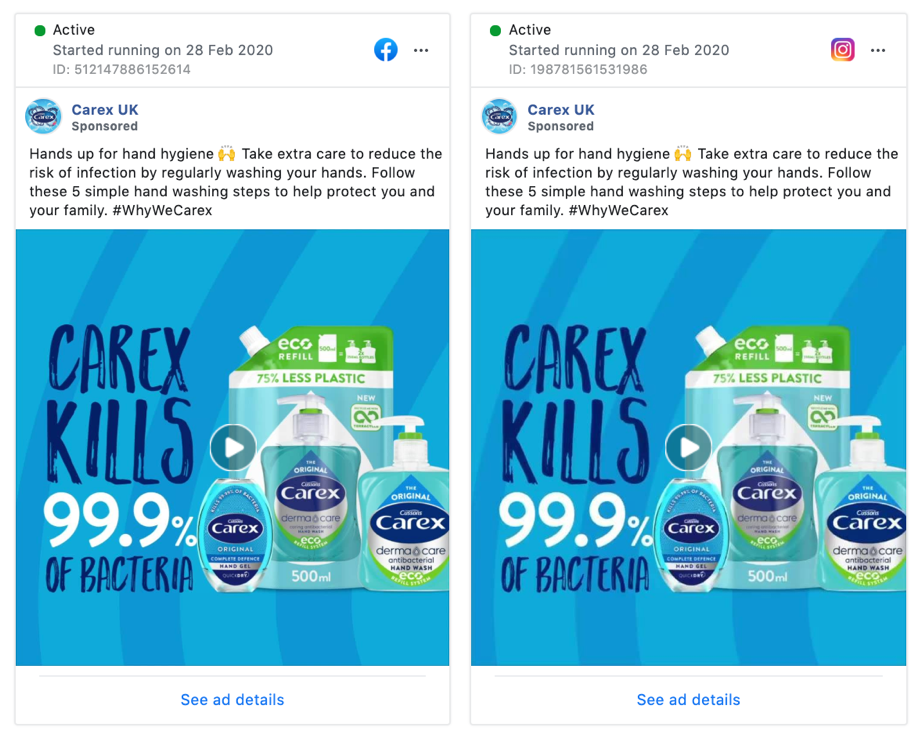Want to know more about how to help your business in times of crisis and afterwards? Click the button below and our Facebook bot will send you the ebook.
The dos & don’ts for social media communication
With the COVID-19 outbreak spreading around, everybody (including marketers) should be more considerate about what they communicate. Some brands are really trying to educate, inform and be sensitive – we love their approach. The danger should not be belittled. Let’s take a look at what the do’s and don’ts are in a time like this.
What does it mean for the marketing industry?
Major tech events are being cancelled or postponed. Marketing teams are facing a strained change to working remotely. Social media giants are feeling the first drops when it comes to ad revenue. Huge decisions are being put back to an indefinite future date. Six of the largest 10 advertising countries are “currently COVID-19 hotspots.” It has been reported that Facebook has even offered some free ads for the WHO.
The right social media communication has never been a bigger challenge: and every single mistake may not be forgotten so soon. Even a single social media post can cause a forest-fire effect for your brand authority.
Brands that are active on social media are equally responsible for reducing the panic, risk of infection and sharing best practices. However, not all brands come across as ones who take extra caution with very sensitive content in such situations.
Why does social media matter for the communication of coronavirus?
There are four major roles played by social media in these tough times.
1. Social media as a source of information
This is where many people head to for the latest updates, not only in terms of coronavirus. Social media is with us all the time, and for many people, it is the very first source of verifiable information on any topic.
2. Social media as a communication channel
Once we absorb some info, we often want to discuss it and find out the point of view of others. This is where social media comes across as a channel for getting involved in conversations and interactions.
3. Social media as a business card
It does not matter if you keep running your business as usual for now, or if you are rather hidden in the background, waiting for the pandemic to pass. Social media was, is, and still will be your business card. A channel on which to show off your brand. That should not change during this turbulent period.
4. Social media as a customer service platform
What businesses are affected by coronavirus the most? Events, hotels, airlines and the travel industry, just to name a few. They are already going through a lot of turmoil these days and, while they could have not foreseen this exact situation, they should already have had quite a few crisis procedures in place.
How to deal with coronavirus on social media?
The state of affairs has been unpredictable and may remain so for a while. So what is regarded as professional and thoughtful brand behaviour on social media during this crisis? We’ve seen a few good examples:
1. Educate your audience
The very last thing your brand should do on social media is to stop educating everyone in such a situation. It does not hurt to explain and remind, over and over again, everything about good safety practices. Encourage your audience to follow them. You never can post too much of it: we all need advice in the light of a tough situation.
NHS (National Health Service in the UK) do not stop educating across all of their social media platforms – and beyond. Even if you think that everyone must already know about washing hands, they remind about it in almost every single social media post they create and publish. Needless to say that other online and offline communication follows this same path.
What are commercial brands doing about it? Carex is definitely one of the brands on the rise today. While they still run adverts, they do keep them very educational by sharing some hand washing and protective tips, etc.

2. Offer your followers alternatives
The times are uncertain, so in many cases planning some activities can and should wait. A lot of people, though, do not want to change their plans in fear of losing money and time. This is why it is worth going the extra mile to encourage them to do so, even if it costs your brand some revenue. You may lose some income, but win in some other regards: better brand reputation, trust, loyalty and huge respect.
KLM (as have many other airlines, in fairness) have offered free-of-charge changes for all destinations, even those that are not affected by Coronavirus. This flexible rebooking policy ensures that the brand is taking care of its passengers.
3. Highlight solidarity
Be supportive and show a human approach. You will most likely not ease the pain of the whole world, but you can help some people adjust to the situation or show them the bright side of life. All the small things matter.
A Singapore-based online buy&sell app called Carousell is encouraging users to #ChooseToGive. What is this about? Instead of promoting panic buying and stockpiling, Carousell is sharing stories of those who want to give something for free: and feel great about it. One of their stories is about a person who decided to share her protective masks with the elderly, since she realized they probably need them more.
Business does not forget about business, either.
HeySpace, a remote work tool, decided to provide their services free for one month in order to help some newly-built remote teams in this brand new situation. Jason Fried, who is the CEO of Basecamp and an author of “REMOTE: Office Not Required”, chose to refund the purchase price of his book, which could help remote rookies as well.
Plant Jammer speaks bluntly: they do not want to profit on a crisis so they are opening up their paid features – building recipes using AI – for free, to everyone.
4. Keep an eye on efficient customer service
As we mentioned before, the travel industry is taking a huge hit from the crisis. It is bringing up many questions that people want to be answered. If you work in an industry directly affected by the coronavirus, you should be prepared for a bigger-than-usual flow of messages coming your way.
Giants like Airbnb are facing many requests and complaints, so updating their help centre – and being active on social media – is crucial for them.
5. Take responsibility
With great power comes great responsibility.
Even if you have some campaigns planned ahead, or some adverts already published on- or offline, then this may not be the best time to show them to the world. People are raising concerns about the coronavirus, and some campaigns that would not have been found offensive a few weeks ago could be asking for nothing but trouble today. This is why brands should be responsible for the content they release: even if its removal costs them money.
Coors Light campaigns were set to promote their beer as the “Official Beer of Working Remotely”, and its launch was scheduled for the 17th of March. However, since working remotely can now be related to self-quarantining due to COVID-19, the campaign would now be regarded as inappropriate. They chose to halt the campaign for now.
Hersheys is another brand which resigned from a campaign that was already released. Their ads focused on handshakes and hugs upon receiving some candies. The brand decided to switch to product ads for now, without encouraging people to make the most of currently ill-advised, unnecessary human interactions.
It is likely that we’ll see more examples like these to follow, but Coors Light and Hersheys have started setting the precedent in these difficult times.
How NOT to deal with coronavirus on social media? Practices to avoid
Unfortunately, there are still many brands whose social media communication leaves much to be desired. The only excuse they can use – and it is still not a really valid one – is that they do not know how to cope with such a difficult situation.
Don’t point your audience in the wrong direction
Misinformation is one of the biggest enemies in the fight against coronavirus, so spreading what are simply bad practices could be very hurtful and consequential. Make sure you’re not recommending your audience to spend time in shopping malls or fly to badly affected areas for a weekend city break.
It is nothing to laugh about
There will be memes and there will be some tongue-in-cheek comments, but your brand should not jump on that bandwagon. Even if your audience knows well what so-called black humour is, coronavirus is just not a topic to laugh at or to underestimate at the moment.
It is nothing to gain business from either
People are struggling all around the world: making either laughs or money out of the situation is unethical and simply ruthless. We all know that money makes the world go round, but trying to generate income at all costs is not the way to go.
Nothing is stable on social media. Including your content calendar.
You need to adjust your communication to what happens real-time. While we do encourage you to plan your content ahead, your job is to keep double-checking whether it is still relevant or not. Otherwise, it may do more harm than good.
One thing is following your marketing strategy and everything you had planned content-wise.
It’s something else to only stick to your planned content and not react to the situation when you should. Especially when you’re a travel or hospitality company.
How to make the revision of scheduled posts easier?
You can create separate content plans in Kontentino for your ads – so you can glance at them in the calendar, without having to open Business Manager.
Use notes and mark the duration of the campaign + your chosen audience directly next to the post.
Add different-coloured post labels to immediately see what kinds of posts you have scheduled.
This way you can quickly identify these posts and move them to a different date.
To sum up
Brands on social media have a huge impact on the World today, and that includes the coronavirus, no matter how strange it may sound.
We believe that by pointing out several good practices and drawing out clear conclusions, we have given you some food for thought and helped you rethink your strategy. We have a strong belief that such an article is needed to help us all stop making simple mistakes and start sharing only good practices.
Hang in there!




